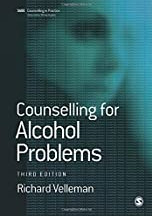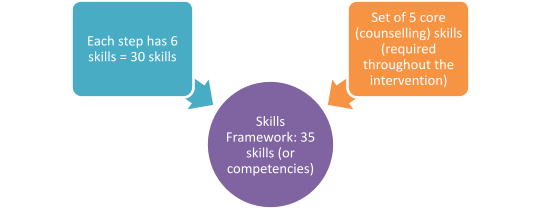Outcome Measurement (the Family Member Questionnaire)
To support therapeutic 5-Step Method practice, and to continue building the global evidence base for the 5-Step Method, we have developed the validated Family Member Questionnaire (FMQ). This is primarily for use with family members affected by a loved one’s alcohol, drug or gambling problem. The FMQ is the best way for practitioners, organisations, commissioners, and family members themselves, to assess whether the 5-Step Method has helped family members.
We want to emphasise that if the FMQ is presented and used in the right way, AFMs value this element of the support, and can often welcome it as part of the help that they are receiving.
The FMQ should be completed by each family member before they start the intervention (ideally as part of an assessment or very early in the first session) and then again towards the end of Step 5 (ideally after the review of Steps 1-4 has been completed). If possible, we also suggest that the FMQ is completed on a third occasion, perhaps as a 3-month follow-up.
The FMQ, together with guidance for its use, scoring and interpretation, can be found in the FMQ box: see link The Family Member Questionnaire (FMQ) Please contact your 5-Step Method nominated person to ensure that you have the correct administrative version of the FMQ for your team/organisation.
© The FMQ is copyright to AFINET. It should not be revised or altered in any way as this will affect its validity although it can be adapted to be administered online. The FMQ can be added to organisational IT systems that are used for the purpose of holding client data.
We are happy to work with organisations to support your analysis of the FMQ data that you collect – for example, by providing a spreadsheet that you can use to collate and analyse your FMQ data.
As part of your agreement with AFINet to use the 5-Step Method, we ask that you (with the appropriate consent and data sharing practices) share anonymised FMQ data with us (along with some basic, non-identifiable demographic information about family member clients). The data that you share with us will be used to build and promote the global evidence base of the 5-Step Method, and can be used at local, regional, country and international levels to promote policy and practice change that is required to ensure that more affected family members receive the help that they so badly need.
Other versions of the 5-Step Method use different outcome questionnaires or have other ways to assess the impact of the intervention. For example, Steps to Cope uses the READ (Resilience Scale for Adolescents). Please contact your nominated 5-Step Method person or contact us at 5stepmethod@gmail.com to find out more.


